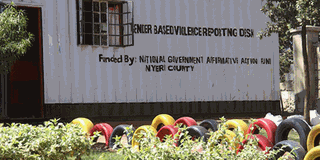GBV survivors' dilemma amid Covid-19

A container office at Nyeri Central Police station for GBV- related issues. Despite the rise in GBV cases, many victims are still unable to access justice. PHOTO | JOSEPH KANYI | NATION MEDIA
On Tuesday last week, Ms Alonyo Otwela a resident of Maraba village in Juja, Kiambu County woke up and got ready to go to work as usual.
However, Ms Otwela who worked in a hotel in Nairobi, did not have bus fare, prompting her to request her husband to bail her out.
Instead, the husband allegedly descended on her with blows and kicks, eventually ended her life.
Juja DCI Commander Mr Daniel Nzau, said the man identified as Gabriel Ajwang’ beat the wife using a belt until she passed out. The man tried to give her first aid but it was too late.
Mr Nzau said upon realising she was not responding, the man told their two children aged between 16 and 18 years that he was going to look for an ambulance to rush their mother to hospital.
“The man never returned. It’s only after he took long that the children informed a neighbour who called the police,” he said.
The Police boss said they found the woman’s body lying on the floor, with preliminary investigations indicating the husband beat her to death. He said they are still looking for the 27-year-old man in connection with the death of his 37-year-old wife.
Constrained resources
This case is among many of domestic violence that have been reported in the country since the Covid-19 pandemic was confirmed in the country.
Gladys Chania, a gender activist says the rise in domestic violence during this period can be attributed to people who previously spent very few hours together but now forced to be together throughout.
This, she says, has made couples note each other’s weaknesses, spiking up conflicts.
“The pandemic has also seen families face constrained resources as there is no room for side hustles due to lockdowns and the curfew imposed by governments. There is lack of tolerance and understanding,” she says.
She, however, observes that cases of gender-based violence (GBV) during this Covid-19 period is taking a funny turn.
“Though there are reports in the villages and estates about the increase of GBV, very few are reporting to the police. Probably the victims fear double stigma since some of the fights around this time revolve around what could well pass as petty like lack of food provision or just verbal abuses,” she notes.
As cases of GBV continue to rise, access to justice is increasingly turning out to be a mirage for survivors.
Sexual violence
Ms Kwamboka Oseko, Legal Associate at Coalition on Violence against Women-Kenya, Covaw (K) says the police are exhibiting laxity in responding to SGBV cases.
“The Chief Justice mentioned a few cases that would be given prominence during this period and one of them is sexual violence cases,” says Ms Kwamboka who also heads Covaw’s Access to Justice Program.
“But there is a bit of disconnect because such cases are not forwarded (by the police) to the Judiciary.”
She says survivors contact Covaw through their more than 50 community activists countrywide, with requests to fast-track action on their complaints.
“Our survivors tell us that the police give them an OB number but refuse to follow up with the cases,” she says.
“The police say ‘the courts are closed and we cannot do anything’. They are telling them ‘wait until Covid-19 has ended then we can see how we can take up this matter’.”
She notes that survivors are concerned that the police prioritise maintaining order and sanity during the curfew over addressing SGBV cases.
Majority of the cases, she says, are reported by women in the low income areas including Kibra, Mathare, Kayole, Mukuru kwa Njenga and Kariobangi.
Through Covaw, the survivors are currently receiving counselling and legal support.
“Sexual violence is happening in the homes because women and girls are locked up with their perpetrators and there are no avenues outside the home to seek help,” she notes.
Police attitude
“Girls are not going to school. Teachers would notice something is wrong and investigate. Women can’t leave Nairobi now and go to their mother’s place in the rural home or find help elsewhere.”
She says without change of police attitude towards SGBV, women and girls would greatly suffer during this Covid-19 period.
“Women rights are human rights and police have the authority to take action against the perpetrators of SGBV to keep safe the girls and women,” she states.
Chief Justice David Maraga on April 2 released a statement that showed the rise in sexual offences since March 13, when Covid-19 was first confirmed in Kenya.
Maraga said sexual offences constituted 35.8 per cent of cases recorded since then which he termed as a worrying trend.
The cases have continued to rise significantly following the government’s announcement of a partial lock down in Nairobi, Mombasa, Kilifi and Kwale counties and the nationwide the 7pm-5am curfew in a bid to contain the spread of the deadly virus.
In most cases, majority of the victims of sexual and domestic violence are normally women and children with men mostly been the perpetrators.





